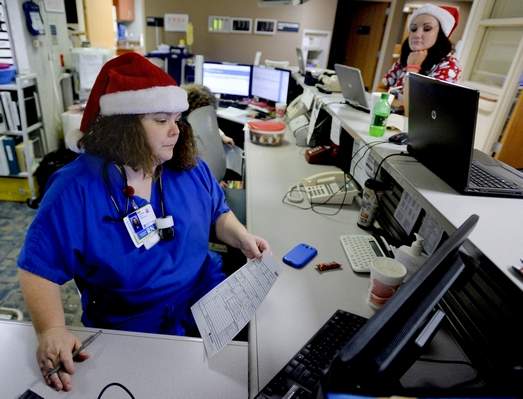If you want to unite with others to campaign for better rights at work, write Judy at workwonks@gmail.com
KJIPUKTUK (Halifax) – Have a holly, jolly Xmas – but if you expect to be paid for the holidays, the Grinch may have something to say about it.
Myth: Boxing Day is a statutory holiday in Nova Scotia.
Reality: No. Boxing Day is a ‘retail closing day’ – if you get the day off, your employer has no obligation to pay you. And, if you work on Boxing Day you are only entitled to your regular wages.
Myth: Everyone gets paid for the holidays of Christmas Day and New Year’s Day.
Reality 1: To get paid for these holidays you have to have done two things: a) You need to be ‘entitled to receive pay’ – in other words worked for pay — for 15 days out of the 30 days preceding the holiday and b) you have to have worked your regular shift the day before and the day after the holiday to qualify for holiday pay.
If you don’t have these two ‘qualifiers’ you get the day off, if your employer is closed, but without pay.
Reality 2: You are not covered by these rules if you are paid on commission only, or you work in car sales, or real estate, or you are an employee on a fishing boat, or you work in the manufacturing or refining processes of the petrochemical industry (unless there is a union), or you work in private domestic service, you might get the day off but usually it’s without pay. If you have to work, it could be for regular wages.
Myth: I worked 15 out of the last 30 days leading up to Christmas Day and New Year’s Day – I’m a part-time worker so I’ll get both days off with pay!
Reality 1: Not so fast! If you worked part-time, your hours worked over the past 30 days are averaged – if the average pay is (let’s say) 4 hours a day, that’s what you’ll get paid for Christmas and New Year’s Day.
Reality 2: Not so fast! You need to have worked your last scheduled day before the holiday and your next scheduled day after the holiday to qualify to be paid.
Myth: I work in a restaurant and it closes from Dec. 20 to Jan. 2 – I guess I won’t be paid for Christmas Day or New Year’s Day.
Reality: You are owed pay if you worked and were paid for 15 of the 30 days preceding either holiday. The problem is that from Nov. 20 to Dec. 20 you need to have worked for at least 15 days. And you had to have worked your regular shift before the shut down on Dec. 20, and the next regular shift after it re-opens on Jan. 2.
Myth: I am working New Year’s Day, since I work at a bar and it’s open. I should get time and a half, right?
Reality: You get more — if you are entitled to be paid for the holiday in the first place (see above). You get your regular pay for your shift on New Year’s Day plus time and a half. For example, if you work 8 hours on New Year’s Day, you get paid for 20 hours.
Note: All the examples are based on employees who are covered by NS Labour Standards because they are not in a union. If you are in a union, your collective agreement likely has much better holiday coverage for you. Many unionized workers get Christmas Day, New Year’s Day and Boxing Day off with pay. Check your collective agreement or ask your shop steward!!
See also:
- Know your rights: More on bosses breaking the law on Remembrance Day
- Rock bottom – Paid holidays and labour standards in Nova Scotia
Judy Haiven is a retired Professor of Industrial Relations at Saint Mary’s University. She is also co-chair of the Canadian Centre for Policy Alternatives – Nova Scotia.
If you want to unite with others to campaign for better rights at work, write Judy at workwonks@gmail.com






